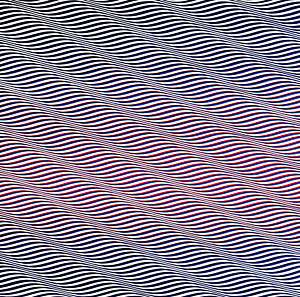Texture (painting)
Texture in painting is the look and feel of the canvas. It is based on the paint, and its application, or the addition of materials such as ribbon, metal, wood, lace, leather and sand. The concept of 'painterliness' also has bearing on texture. The texture stimulates two different senses; sight and touch. There are four types of texture in art: actual texture, simulated texture, abstract texture, and invented texture.
Actual texture
This is a combination of how the painting looks, and how it feels to the touch. It is associated both with the heavy buildup of paint, such as an impasto effect, or the addition of materials.
Simulated texture

Creating the visual effect of texture without actually adding texture. For instance, a texture created to look like something other than paint on a flat surface. An example is Cataract 3, painted in 1967 by Bridget Riley, which creates the illusion of ripples in the paper through the repetition of lines.
Visual texture
Texture that does not directly represent the object it is connected with but the concept of the object is translated in textural patterns.
Invented texture
A creative way of adding alternate materials to create an interesting texture. Invented texture typically appears in abstract works, as they are entirely non-objective.
See also
References
- Ocvirk, Otto G.; Robert E. Stinson; Philip R Wigg; Robert Bone; David L Cayton (2008). Art Fundamentals: Theory and Practice (11 ed.). New York: McGraw-Hill Higher Education.